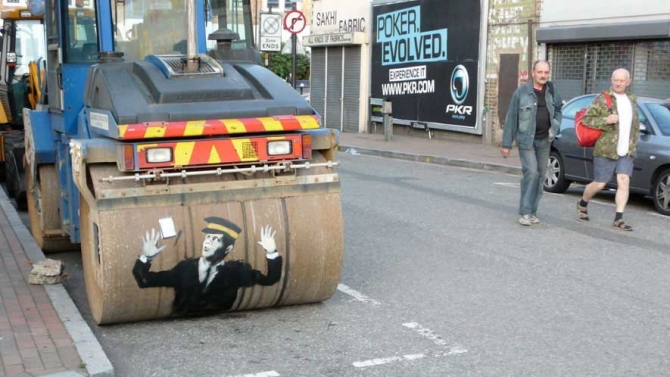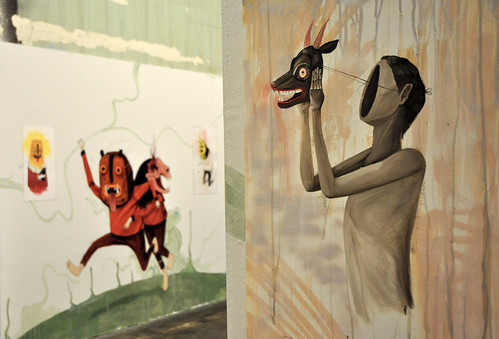Literally, cagado (kah • GAH • though) means "shat", "shitted", "shit", or whatever past participle you choose for the verb "to shit". In Mexican slang something cagado if it is very funny. It is an informal expression but it is not offensive, and has absolutely nothing to do with feces. Use it confidently.
The video of the little boy dancing quebradita (a dance characterized by small, frequent jumps) is a good example of something cagado.
Thursday, June 16, 2011
Saturday, June 11, 2011
Oclayo
Oclayo (awe • KLAH • jaw) means eye, and it is a derivative of ojo (lit. eye). It is typically used in conjuntion with echar, as in echar un oclayo (lit. throw an eye), which means "to keep an eye" or "to take a look."
Example 1:
Porfas, échale un oclayo mientras voy a echar la firma.
Would you please keep an eye on this while I go to take a leak?
Example 2:
Le eché un oclayo a unas boclas de segundo cachete muy chidas, me latieron mucho.
I saw a pair of second-hand speakers pretty cool, I really liked them.
Spanish filmmaker Luis Buñuel shocked the world in 1929 with his surrealist short movie "Un Chien Anadalou" (An Andalousian Dog). The film opens with a scene in which the oclayo of a woman is cut with a razor blade. Échale un oclayo a la película.

Example 1:
Porfas, échale un oclayo mientras voy a echar la firma.
Would you please keep an eye on this while I go to take a leak?
Example 2:
Le eché un oclayo a unas boclas de segundo cachete muy chidas, me latieron mucho.
I saw a pair of second-hand speakers pretty cool, I really liked them.
Spanish filmmaker Luis Buñuel shocked the world in 1929 with his surrealist short movie "Un Chien Anadalou" (An Andalousian Dog). The film opens with a scene in which the oclayo of a woman is cut with a razor blade. Échale un oclayo a la película.

Tuesday, June 7, 2011
Ni paper-mate
Ni paper-mate (nee • pay • per • mate) is an expression that would make you sound like a proper Chilango slang speaker. It is a derivative of ni pedo (lit. "not even fart") which is an interjection to convey frustration and solidarity, similar to "what can you do about it!" when actually nothing can be done. Paper-mate is a brand of pens and retractable pencils.
Example:
Demóstenes: Iba en mi democrático, me cuajé y me bajaron el billuyo de la quincena.
Cucho: Ni paper-mate. Al monte pío.

Paper-mate ad, 1980s.
Example:
Demóstenes: Iba en mi democrático, me cuajé y me bajaron el billuyo de la quincena.
Cucho: Ni paper-mate. Al monte pío.
Demóstenes: I was riding the bus, fell asleep and my pay of two-weeks was stolen.
Cucho: What can you do about it! Now you gotta go to the pawn shop.
Cucho: What can you do about it! Now you gotta go to the pawn shop.

Paper-mate ad, 1980s.
Friday, June 3, 2011
No canta mal las rancheras
Rancheras (lit. "from the ranch") are songs from the countryside highly popular before Mexico became a mostly urban country. They are often played by a mariachi band and follow a waltz-ish rhythm. The expression no canta mal las rancheras means "(s)he is not bad at singing ranch-style music". This colorful expression is used to convey that, against what some could expect, a person has an above-par performance or has above average attributes.
Example:
Gualberto: Eres un culero. Pusiste a tus empleados a parir chayotes, haciéndolos chambear en días feriados.
Benito: Pues tú no cantas mal las rancheras, maestro. Tus empleados se quejan de que te vale verga cuando te piden días de incapacidad.
Gualberto: You're a son of a bitch. You gave your employees a hard time, making them work on holidays.
Benito: You don't treat your employees any better. They complain that you don't give two shits, and deny them sick days whenever they ask.
Here is a great example of a ranchera, interpreted by Juan Gabriel, who's sometimes referred to as the Mexican Prince, after the Minneapolitan artitst. It should be clear that Juan Gabriel no canta mal las rancheras.
Example:
Gualberto: Eres un culero. Pusiste a tus empleados a parir chayotes, haciéndolos chambear en días feriados.
Benito: Pues tú no cantas mal las rancheras, maestro. Tus empleados se quejan de que te vale verga cuando te piden días de incapacidad.
Gualberto: You're a son of a bitch. You gave your employees a hard time, making them work on holidays.
Benito: You don't treat your employees any better. They complain that you don't give two shits, and deny them sick days whenever they ask.
Here is a great example of a ranchera, interpreted by Juan Gabriel, who's sometimes referred to as the Mexican Prince, after the Minneapolitan artitst. It should be clear that Juan Gabriel no canta mal las rancheras.
Tuesday, May 17, 2011
Iguanas-ranas
Iguanas-ranas literally means "iguanas-frogs." This expression has absolutely nothing to do with reptiles or amphibians. However, it shows very clearly a principle of Mexican slang: take something that sounds similar but is wildly unrelated, then complement it with something that rhymes, and you have a nice expression. Iguanas-ranas (or just iguanas) is used instead of igualmente, which stands for "me too" or "same here."
Example:
Josefa: La pasamos de huevos. La neta, no faltó nada. Ha sido el mejor reventón. ¿Ustedes qué pedo? ¿cómo lo vieron?
José María: Iguanas-ranas. Mega chido.
Josefa: We had a great time. Honestly, we got everything we needed. It's been the best party ever. ¿What about you? ¿How did you like it?
José María: Same here. Quite awesome.
Example:
Josefa: La pasamos de huevos. La neta, no faltó nada. Ha sido el mejor reventón. ¿Ustedes qué pedo? ¿cómo lo vieron?
José María: Iguanas-ranas. Mega chido.
Josefa: We had a great time. Honestly, we got everything we needed. It's been the best party ever. ¿What about you? ¿How did you like it?
José María: Same here. Quite awesome.
Tuesday, May 10, 2011
Sáquese
Literally, sáquese (SAH•kess•eh) means get yourself out. In Mexican slang its meaning is pretty much the same as "get out of here!" or "take a hike!" For old-schoolers (e.g. my parents), it is inappropriate. However, it is not considered an insult. It is just a solid, informal expression. Use it. Sometimes it's accompanied by "que", as in sáquese que, which is just a resource to add emphasis.
Example:
Activista: Necesitamos su apoyo. Cada uno de nosotros puede poner un granito de arena para salvar al coyote cojo, una especie en peligro de extinción que sólo se encuentra en en valle de Tepizcoloyo y en las praderas de San Casmeo.
Seño: ¡Sáquese que! Mejor pónganse a estudiar, pinches huevones.
Activist: We need your support. Each of us can make a difference to save the limping coyote, an endangered species only found in Tepizcoloyo Valley and in the plains of San Casmeo.
Ma'am: Get out of here! You should be in school, damn lazy asses.

Example:
Activista: Necesitamos su apoyo. Cada uno de nosotros puede poner un granito de arena para salvar al coyote cojo, una especie en peligro de extinción que sólo se encuentra en en valle de Tepizcoloyo y en las praderas de San Casmeo.
Seño: ¡Sáquese que! Mejor pónganse a estudiar, pinches huevones.
Activist: We need your support. Each of us can make a difference to save the limping coyote, an endangered species only found in Tepizcoloyo Valley and in the plains of San Casmeo.
Ma'am: Get out of here! You should be in school, damn lazy asses.

Monday, April 18, 2011
Sóbese
¡Sóbese! literally means "rub yourself!" It is an interjection to express morbid sympathy for someone who has being physically or emotionally injured. Sometimes Mexicans use se vale sobarse, which means "rubbing the injury to dissipate the pain is allowed".
It always has to be exclaimed with emphasis. The tone and volume of ¡sóbese! convey its severity of the injury.
It always has to be exclaimed with emphasis. The tone and volume of ¡sóbese! convey its severity of the injury.
Thursday, March 24, 2011
Hacer manita de puerco
Literally, manita de puerco means "pork little hand." Hacer manita de puerco has nothing to do with preparing pork feet (see salir por patas). Hacer manita de puerco means "to twist somebody's arm in a painful way." It is a metaphor to indicate that the person whose arm is twisted is being forced to do something against her will.
The cartoon below shows a union leader haciéndole manita de puerco to a politician.
![[helguera+MANITA+DE+PUERCO.jpg]](https://blogger.googleusercontent.com/img/b/R29vZ2xl/AVvXsEgH46ihKyJXDptV6a6WRw8z4d7WGX7t1f_Xc6yvloETqWkXaUab_60VpE5FZo_XQysDXTexvSmEJkJaimxgbVIltkrCZeCYDt_Z4k6zwrrlthU1naQaHyxATV0XqZC0CUEN6z9PibgMGiFv/s400/helguera+MANITA+DE+PUERCO.jpg)
Cartoon "Manita de puerco" by Helguera.
The cartoon below shows a union leader haciéndole manita de puerco to a politician.
![[helguera+MANITA+DE+PUERCO.jpg]](https://blogger.googleusercontent.com/img/b/R29vZ2xl/AVvXsEgH46ihKyJXDptV6a6WRw8z4d7WGX7t1f_Xc6yvloETqWkXaUab_60VpE5FZo_XQysDXTexvSmEJkJaimxgbVIltkrCZeCYDt_Z4k6zwrrlthU1naQaHyxATV0XqZC0CUEN6z9PibgMGiFv/s400/helguera+MANITA+DE+PUERCO.jpg)
Cartoon "Manita de puerco" by Helguera.
Saturday, March 19, 2011
Large numbers

On a warm morning, a Buddhist monk visiting Mexico saw a little kid playing on the beach. The kid was digging in the sand. He was creating a small pond that was getting filled with water from the ocean. The monk asked him if he knew how many ponds could be filled with all the water of the ocean. The kid stared at the monk and without hesitation said: just about pinche mil chingocientos.
Here are some large numbers worth knowing. Use them with confidence in reference to amounts and quantities emphatically large:
Un Chingo
Un Putero
Un Madral
Un Putamadral = Un Putero x Un Madral
Un Chingomadral = Un Chingo x Un Madral
Pinche mil chingocientos = un putero de chingos de madrales
Thursday, March 10, 2011
Planchar el traje
Literally, planchar el traje means "to press or iron the suit". It is an expression used to convey that something passed like a steam roller over somebody, leaving his or her suit completely wrinkle free. It's a metaphor for a clear defeat. It is commonly used in sports and professional life. A synonym would be "to walk over".
Example:
¡Chale! Volvió a plancharnos el traje nuestro acérrimo rival.
Damn! our arch rival walked over us one more time.

Art by Banksy.
Example:
¡Chale! Volvió a plancharnos el traje nuestro acérrimo rival.
Damn! our arch rival walked over us one more time.

Art by Banksy.
Monday, March 7, 2011
Pípiripau
In the mid-1980s the band Los Plebeyos (The Plebeians) popularized the song "El Pípiripau". Its lyrics describe a guy who's followed by women--although he claims he does not consider himself too handsome (muy carita). Part of the chorus goes like this:
Me siguen las mujeres
Es porque tengo lo que quieren
The song is full of false modesty. The term pípiripau is used to refer to a dude who thinks very highly of himself, either when it comes to girls or to success in life. Check out the music video below.
Me siguen las mujeres
Es porque tengo lo que quieren
The song is full of false modesty. The term pípiripau is used to refer to a dude who thinks very highly of himself, either when it comes to girls or to success in life. Check out the music video below.
Monday, February 28, 2011
Pandroso
Mexicans do not agree on many things. But when somebody wears dreadlocks, facial hair and skateboard attires, looks like a ska singer, and smells like patchouli, many will agree that you are in presence of a pandroso. To be or not to be a pandroso, that's a matter of choice. It's not about socioeconomic status. It's just about showering and shaving, some say. It's about being your true self, says the other camp. It is considered an insult only by those who despise pandrosos.
Example:
Hija: Estamos enamorados y nos vamos a vivir juntos a Mazunte.
Madre (muy irritada): No vas a ninguna parte con ese pinche gringo pandroso. Primero que se corte el pelo, se bañe y se vista decentemente. Después veremos si tienes permiso de seguir viéndolo.
Example:
Hija: Estamos enamorados y nos vamos a vivir juntos a Mazunte.
Madre (muy irritada): No vas a ninguna parte con ese pinche gringo pandroso. Primero que se corte el pelo, se bañe y se vista decentemente. Después veremos si tienes permiso de seguir viéndolo.
Daughter: We are in love. We're moving to Mazunte and we'll live together.
Mother (highly irritated): You're not going anywhere with this useless American hippie. First, he needs a good haircut, a bath and decent clothes. Only after that we'll see if you have my permission to keep seeing him. Friday, February 25, 2011
Pasarse de tueste
Literally, pasarse de tueste means "to over-roast". It is used to express that a person has gone too far. It is not offensive yet it is utterly informal. In the scale of harshness, it is the least harsh among the expressions: pasarse de verga, de corneta, de camote, and de lanza. Perhaps a bit harsher than pasarse de la raya.
Example:
Deudor: No se apure. Sí traigo la lana para pagarle sus 3 mil pesos. Nomás que antes necesito que me preste otros 6 mil pesos.
Prestamista: No te pases de tueste, maestro. O pagas o pagas. Tú elige.

Example:
Deudor: No se apure. Sí traigo la lana para pagarle sus 3 mil pesos. Nomás que antes necesito que me preste otros 6 mil pesos.
Prestamista: No te pases de tueste, maestro. O pagas o pagas. Tú elige.
Debtor: Rest assured I have the dough to payback the 3 thousand pesos. I just first need another loan for 6 thousand.
Loan shark: Don't even think about it, pal. You choose: pay now or pay now.

Grafitti by Saner.
Saturday, February 19, 2011
¡Tómala papá!
When conveying an emotion, timing is of the uttermost importance. The expression ¡tómala papá! will set you on a par with home-grown Chilangos. Tómala papá literally means "take it, dad." It is used to express astonishment when someone takes a hit, whether actually or figuratively. It could be in sports (a big tackle), in a fight (a big punch), in a politician's career (an exposé of extramarital affairs), in finance (when a stock plummets) or in a car accident, among many other situations. The expression should be uttered with force and without pause, as a single word. With gals you must not say ¡tómala mamá! Stick to papá. It's just an expression. Trying to adjust it would be as inappropriate as saying "daughter of a bitch."
Perfect example: Wikileaks. ¡Tómala papá!

Perfect example: Wikileaks. ¡Tómala papá!

Sunday, February 13, 2011
Ponte guapo
Ponte guapo literally means "make yourself handsome". Perhaps a more proper interpretation is "make yourself look good". It is used as an invitation for somebody to do something nice (for a change) and treat the person using the expression.
A related, more formal expression is cortar una rosa de tu jardín. It also means to treat somebody.
Example:
Lionel: Póngase guapo y saque las caguamas.
Xavier: Sí, profe, que se corte una rosa de su jardín.
Josep: Sale. Si ganamos prometo que yo pongo las frías.
A related, more formal expression is cortar una rosa de tu jardín. It also means to treat somebody.
Example:
Lionel: Póngase guapo y saque las caguamas.
Xavier: Sí, profe, que se corte una rosa de su jardín.
Josep: Sale. Si ganamos prometo que yo pongo las frías.
Lionel: Do something nice and buy us a few rounds of 40-ouncers.
Xavier: C'mon, coach, treat us this one time.
Josep: OK. If we win I will buy the booze.
Wednesday, February 9, 2011
Pasarse por el arco del triunfo
Pasarse por el arco del triunfo something means to not give shit about that something. The expression literally means "to pass [something] under the Arc de Triomphe". Yes, the Parisian landmark. Arco del trunfo is used as a metaphor for one's crotch. If you don't give a damn about something such as a request or a command, you pass it under your crotch or your nads. It's obviously a guys' expression.
A less friendly yet more assertive version of the same expression is pasarse por los huevos. Same meaning, easier metaphores. Huevos (eggs) stand for testicles.
Example:
Pedro: El pinche elevador se chingó de nuez. Es la tercera vez esta semana.
Carlos: Pues interpón una queja ante la procuraduría del consumidor.
Pedro: ¡Simón! El ojete del casero se pasa todas esas quejitas por el Arco del Triunfo.
A less friendly yet more assertive version of the same expression is pasarse por los huevos. Same meaning, easier metaphores. Huevos (eggs) stand for testicles.
Example:
Pedro: El pinche elevador se chingó de nuez. Es la tercera vez esta semana.
Carlos: Pues interpón una queja ante la procuraduría del consumidor.
Pedro: ¡Simón! El ojete del casero se pasa todas esas quejitas por el Arco del Triunfo.
Pedro: The friggin' elevator is out of order again. This is the third time this week.
Carlos: File a complaint before the consumer office.
Pedro: Yeah right! That son of a bitch doesn't give shit about those complaints.
Subscribe to:
Posts (Atom)







